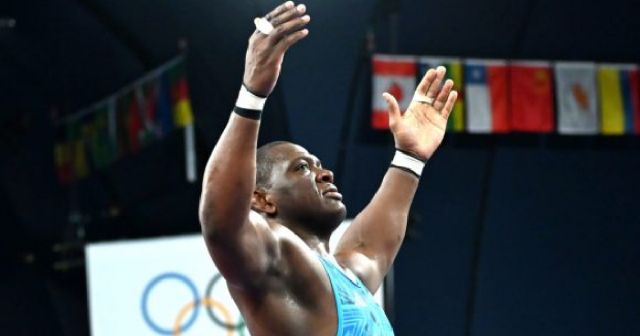The five-time Olympic champion in Greco-Roman wrestling, the Cuban Mijaín López, was a guest on the television program Mesa Redonda, where he reflected on his journey to reach Paris 2024 and expressed his dissatisfaction with Russia's exclusion from these Olympics, a measure taken by the International Olympic Committee (IOC) due to this country's invasion of Ukraine.
According to the Cubadebate site, the Giant of Herradura said on the program that "unjustly the Russians could not be in the Olympic Games, but we are going there to exchange with them and show that sports have nothing to do with politics."
However, those were not the exact words of the athlete, who did not use the adverb "unjustly." The one who did use it was the presenter of the Mesa Redonda, Randy Alonso Falcón, who said, "the Russians could not be in the Olympic Games, unjustly."
As the director of the official portal Cubadebate, Alonso Falcón allowed himself to distort the words of the champion in the article published about Mijaín's intervention in the Mesa Redonda.
What were Mijaín's exact words? When asked about his trip to Russia, organized as a tribute by the three-time Olympic champion of Greco-Roman wrestling, Alexander Karelin, the Cuban athlete replied:
"The expectations are going to be exciting. I believe that being in Russia is an honor, after they were eliminated from the Olympics... I don’t think it should have been that way, because I believe that the political side has nothing to do with sports; because sports is the union of all cultures and all athletes, and brotherhood."
It is evident that the official media directed by Alonso Falcón attributed to Mijaín words he did not say verbatim, which were instead used by the presenter of the Mesa Redonda, who labeled the decision of the IOC as "unjust."
In the eye of the controversy for his demonstrations of support for the totalitarian regime that dominates the Island, and admiration for its creator, the dictator Fidel Castro, Mijaín has been appearing on all official stages since his return from Paris. From La Piragua, on the Malecón in Havana, the wrestler paid tribute to "our undefeated commander."
"I believe that with our presence here, we are reaffirming all the continuity that he left here in this homeland," said the athlete on the eve of the tyrant's birthday.
Despite advocating for the depoliticization of sports, the truth is that the deputy of the National Assembly of People's Power (ANPP) has been turned by the regime into a new champion of the so-called "revolutionary sport."
Its image continues to be handled by the propaganda of a totalitarian regime that employs violence against those who dissent or demand rights and freedoms, appealing to its corpulence as a symbol of the dictatorship's strength.
In his latest television appearance, the athlete—who has lent himself multiple times to this game with the dictatorial power, even physically assaulting an activist during the recent Pan American Games in Chile—positioned himself in favor of Russia, just as the Cuban regime does regarding this country's invasion of Ukraine.
Cuba is one of the few countries that positions itself in favor of Russia within the international community, which has increased Russia's isolation in light of the growing evidence that Vladimir Putin's regime is committing genocide and war crimes on Ukrainian territory.
Russia's invasion of Ukraine has resulted in more than 30,000 civilian casualties, including dead and injured, and six million refugees in a country with over 43 million inhabitants. In February, President Volodymyr Zelensky said that 31,000 Ukrainian soldiers had died, but estimates based on U.S. intelligence suggest higher losses.
The IOC barred Russia and Belarus from participating in the Paris 2024 Olympics due to the Russian invasion of Ukraine with Belarusian support. The IOC argued that the Russian Olympic Committee violated the Olympic Charter — the competition's regulations — when it unilaterally absorbed the sports organizations from the Ukrainian regions of Donetsk, Kherson, Luhansk, and Zaporizhia, which were illegally annexed by Russia.
The Russian autocrat accused the IOC of "discrimination." Additionally, in response to the ban, Putin decided to organize his own international sports competition: the International Friendship Games, referring to another similar event organized by the USSR in 1984.
Despite the decision of the IOC, which Alonso Falcón deemed unfair, the pro-government journalist had no qualms about applauding the decision of its president, the German Thomas Bach, to honor the five-time Olympic champion in Paris.
What do you think?
COMMENTFiled under:
